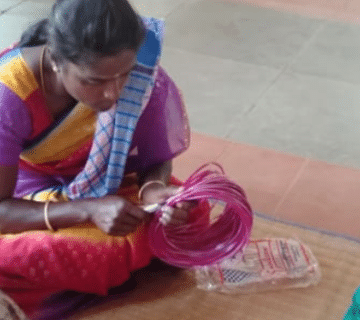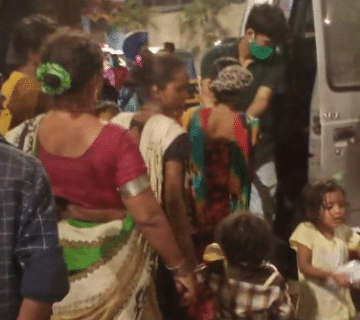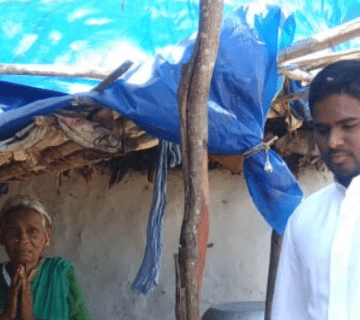“It’s a meeting of hearts. We’re joining hands in order to build a world of peace.”
With these words, Vinu Aram, speaking on behalf of the Shanti Ashram, greeted Chiara Lubich, founder of the Focolare Movement, in Coimbatore, in the South Indian state of Tamil Nadu, on 5 January 2001.
Ms. Lubich had just been awarded the Defender of Peace Prize during an official ceremony before a qualified audience of over 500 people, among whom were several who had been companions of Gandhi.
This award was established by two prestigious Hindu-Gandhian institutions: the Shanti Ashram and the Sarvodaya Movement. The Shanti Ashram is an organization committed to work in the social and educational fields for those most in need. For several years it has been actively collaborating with the New Families – a branch of the Focolare Movement – in their Adoptions at a Distance programme. The Sarvodaya Movement draws its inspiration from one of the key ideas of Gandhi, that is the commitment to work towards the goal of a dignified life for all.
This award is reserved for persons of outstanding moral stature and has been awarded only eight times. Among those who have received the prize are the Rev. Kajitan, a disciple of Gandhi; Homer Jack, First Secretary-General of the World Conference on Religion and Peace (WCRP); and Mother Teresa of Calcutta.
According to the citation for the award, Chiara Lubich was chosen “for her untiring role in sowing seeds of peace and love among all peoples” and for being a sign that “the message of Jesus Christ remains relevant, fresh and beneficial in the resolution of contemporary problems”.
Shri Krishnaraj Vanavarayar, President of the Coimbatore headquarters of Bharatiya Vidya Bhavan, a cultural and religious institute which is one of the reference points of orthodox Hinduism, gave a very warm address which was in profound spiritual harmony with Chiara Lubich’s words. He welcomed her as a person “with a capacity to show us the pathway for overcoming divisions and hatred”.
He said, “India, while possessing a great cultural and religious heritage which is pluralist and tolerant, must today face new challenges, new social problems which are accompanied by tensions and divisions; it has to measure up against economic and technological development often marked by a materialistic mentality and devoid of moral values . . . The central issue is how hatred can be conquered by love, how love can be transmitted to others. Chiara has a strength in her which has made this dream possible, because she has had the experience of God”.
Ms. Lubich was asked to base her acceptance speech on her own personal spiritual experience; but before doing so, she emphasised that her main desire while in India was to listen and learn, in order to open up a cordial dialogue with India’s people, who have a very ancient culture and religious tradition, and a great sensitivity to spiritual values.
As she frankly recounted the fundamental steps in her own experience of living the Gospel, she referred frequently to the Hindu tradition. For instance, speaking about the beginnings of the spirituality of unity, which has its source in God’s love, she quoted a Hindu hymn: “God loved us first because it was he who gave us love, and he causes this love to grow in us when we seek him”.
Recalling the experience of solidarity and sharing with those in need, which she and her first companions had during the Second World War, she noted that the Lord had led her, and her companions “to discover the very heart of the Gospel: the law of love”. She cited the “Golden Rule”, common to all religions, as being fundamental. The words, “Do to others what you would have them do to you” called to mind one of Gandhi’s sayings “You and I are one. I cannot hurt you without harming myself”. “It is a love,” she continued, “which is given to both friend and foe”.
Because of this experience, the Focolare Movement has sought to be present in many situations of division and struggle, in order to recompose unity and to bring hope and peace. Ms. Lubich also outlined the Focolare’s commitment to a dialogue of fraternal love, of life and of prayer with the faithful of other religions. She concluded by saying, “Our conviction was that wherever there was a synagogue, a mosque or a temple, our place was there. We were – and we still are – convinced that we are all called to build together a universal brotherhood among all people.”
The following day, Ms. Lubich gave this same message to the children who are part of the Shanti Ashram’s educational project. In a colourful and affectionate meeting with several hundred children, at the center of the Shanti Ashram on the outskirts of Coimbatore, she asked them to make room “for the flame of love that you have in your hearts” so that you may be an example for the adults, by loving everyone, the good and the bad.
On 10 January, Chiara Lubich was in Calcutta where she was invited to share her spiritual experience with the Indian Conference of Catholic Bishops. She visited also the Motherhouse of the Sisters of Charity and the tomb of Mother Teresa, with whom she had a deep spiritual friendship.


 Italiano
Italiano Español
Español Français
Français Português
Português


